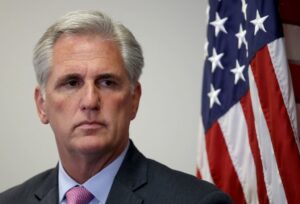In the same week Ma Ying-jeou, former president of Taiwan, began a 12-day visit to China to discuss easing tensions between Beijing and the Taipei government, current President Tsai Ing-wen will make a two-stop transit of the United States. New moving parts in an already dynamic geopolitical arena. Ma’s trip to the People’s Republic of China (PRC) will be more of a slog amid the Chinese Communist Party’s (CCP) continuous incursions into Taiwanese airspace and threats of using military power to bring the Taipei government under Mainland China’s control. Regarding Tsai’s itinerary, she will stop over in New York City en route to Belize and Guatemala. Taiwan’s president will spend time in Los Angeles on her way back.
Ma’s mission to China is to find avenues for appeasing the PRC. Consequently, the folks back home in Taipei are not pleased. Since Ma has no official position and does not speak for the Taiwanese government, the best his conversations can do is show willingness to talk about issues with no commitments. Officially, Ma’s office said he was on the mainland to pay respect to his ancestors during Tomb Sweeping Day, also known as the Qingming Festival. This is a holiday one hundred and four days following the winter solstice to visit ancestors’ gravesites and literally sweep away debris. Ma also took college-age students with him on his ancestral pilgrimage. “I hope to improve the cross-strait atmosphere through the enthusiastic interactions of young people, so peace can come to us faster and sooner,” he explained at the airport before departing for Shanghai, according to Barron’s.
Skeptical of Taiwan Official’s Trip to Chinese Mainland
Some are skeptical about the purpose of Ma’s mission in the PRC. “China obviously wants to create the impression that as President Tsai is having an important visit in the US, a former leader from Taiwan is making an ice-breaking trip in mainland China, DPP (Democratic Progressive Party),” legislator Wu Szu-yao explained, according to the South China Morning Post. Wu went on to say, “Ma was allowing Beijing to use him as a pawn against the Tsai government and the US.” Lending validity to Wu’s sentiment, China Daily, one of the CCP’s propaganda news outlets, gushed, “Ma Ying-jeou served as the island’s leader between 2008 and 2016, during which the two sides of the Taiwan Straits undertook a wide number of exchanges and cooperation … which embodies the one-China principle and opposing ‘Taiwan Independence.’” Beijing was getting as much mileage as possible from Ma’s presence on the mainland.
Meanwhile, President Tsai was on a mission of her own. Taiwanese dignitaries often pass through the United States on official trips to Central and South America and the Caribbean. Tsai will visit Belize and Guatemala to shore up support for the Taipei government in the wake of Honduras severing diplomatic relations with Taiwan in favor of establishing ties with the PRC. Having financial support from the CCP to ease its economic woes, Honduras succumbed to the financial extortion that accompanies Beijing bailouts. As Danielle Wallace reported for Fox News:
“It is not clear what influenced Honduras’ government change. However, China, which is building a massive dam in Honduras, generally uses trade and investment as incentives for switching ties, as it has done successfully with Costa Rica, Panama, El Salvador, Nicaragua, and, most recently, South Pacific nations including the Solomon Islands.”
The loss of Honduras to the China camp could be considered a colossal failure for the Biden administration. Secretary of State Antony Blinken and his Foggy Bottom team might have been more proactive in persuading Honduras by equaling or exceeding whatever enticement the CCP offered. However, being a day late and building a dam short, in this case, is all too often the hallmark of the current administration.

Kevin McCarthy (Photo by Win McNamee/Getty Images)
China Not Pleased
However, the PRC has its dander up over the plan for Tsai to meet with Speaker of the House Kevin McCarthy at the Ronald Reagan Presidential Library in Simi Valley, CA, on her stop in Los Angeles. Beijing officials have the notion they can intimidate US government officials with threatening rhetoric. “In Beijing, Chinese Foreign Ministry spokesman Wang Wenbin said that it strongly opposed any contacts between the United States and Taiwan’s government and that it had already made ‘stern representations’ to Washington about the stopovers,” Reuters said. Such posturing has been unsuccessful in the past, and nothing suggests it will persuade McCarthy to cower this time.
The relationship among China, Taiwan, and the United States has been dynamic for more than seven decades. US support of the Taipei government has been the catalyst for the diplomatic turbulence. However, it is unlikely anything will change anytime soon. US strategy, ambiguous as it is, looks enduring.
The views expressed are those of the author and not of any other affiliation.
Do you have an opinion about this article? We’d love to hear it! If you send your comments to [email protected], we might even publish your edited remarks in our new feature, LN Readers Speak Out. Remember to include the title of the article along with your name, city, and state.
Please respect our republishing guidelines. Republication permission does not equal site endorsement. Click here.

